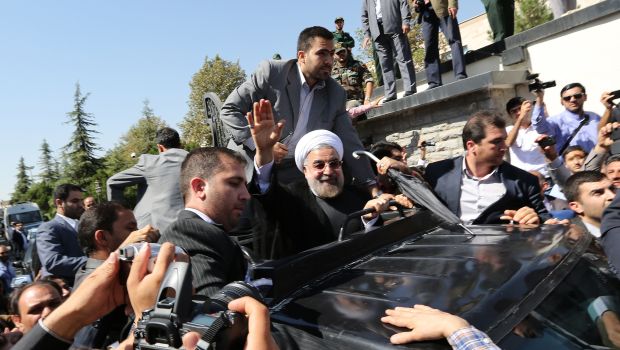
Iranian president Hassan Rouhani waves to supporters as his motorcade leaves Tehran’s Mehrabad Airport upon his arrival from New York on September 28, 2013.(AFP PHOTO/ATTA KENARE)
It seems that the president and his ministers are facing a difficult and busy period as they seek to sustain the diplomatic momentum gained in New York while fending off criticism from more conservative parts of Iranian society and government.
According to Hossein Naqavi, the spokesman for the Iranian Parliament’s national security committee, the foreign minister has been asked to appear before Parliament on Tuesday about Rouhani’s recent trip to New York and his telephone conversation with President Obama.
The government is also taking its own steps to promote Rouhani’s efforts in America to the Iranian public.
In a bid to remove some misunderstandings about Iran’s recent talks with world powers regarding the country’s nuclear activities, Iran’s deputy foreign minister for legal and international affairs has ruled out the possibility that the Islamic Republic may stop its uranium enrichment activities.
“We have been insisting for 10 years that suspending enrichment is impossible,” Abbas Araqchi said on Saturday.
He added, however, that “the frameworks, level, volume, form and location of enrichment can be the subject to negotiations.”
While negotiations over the future of the Iranian nuclear program are still only a possibility, the biggest news off the back of Rouhani’s first trip to the UN as president was his telephone conversation with Obama.
That telephone conversation was the first direct communication between the presidents of the two countries since Islamic Revolution in 1979.
The two presidents spoke briefly while Rouhani was waiting for his plane at John F. Kennedy Airport.
Any communication between Iranians and high-ranking US officials has been considered taboo in Iran for the past three decades, leading to a freeze in diplomatic relations and many missed opportunities for diplomacy.
After the end of his trip to New York, Rouhani was welcomed back to Tehran on Saturday by hundreds of supporters hailing his trip.
In the days since, some political and religious figures inside Iran have expressed their full support for Rouhani’s diplomatic opening with the West.
Isfahan’s Friday prayers leader, Mohammad-Taqi Rahbar, has said in an interview with Qanoon newspaper published on Sunday that “the slogan ‘Death to America’ is not a verse of the Qu’ran.”
His comment suggests that there is no reason this anti-Western sentiment, chanted regularly by Iranians of a certain political persuasion at public events, cannot be removed from the discourse of ordinary Iranians.
“We chanted ‘Death to the USSR’ for many years. So if Iranian–US relations improve now, if they become like Iranian–Russian [relations], that problem would be resolved as well,” he added.
Sadeq Zibakalam, an Iranian political analyst, told Etemaad newspaper on Sunday that those who support enmity with the United States are no longer able to stop the improvement of relations between the two countries.
“The conservatives’ task is increasingly difficult. They cannot convince [Iranian] society that the enmity with the US is a must anymore,” said Zibakalam.
But Rouhani was also met at Tehran’s Mehrabad Airport by a number of opponents chanting “Death to America” and “Death to Israel.”
The strong criticism of Rouhani’s diplomacy should not come as a surprise, however, given the presence of powerful, conservative-leaning lawmakers and civil servants in many Iranian political bodies, including the Parliament.
But Iranian hardliners are not alone in condemning Rouhani’s recent diplomatic moves to improve relations with the United States.
Israeli prime minister Benjamin Netanyahu, who began a three-day visit to the US on Sunday in which he is expected to meet with Obama and present evidence regarding Iran’s nuclear program, said he would “tell the truth in the face of the sweet talk.”
Israel has been one of the most vocal proponents of the idea that Iran is seeking to obtain military nuclear technology. The purpose of Iran’s nuclear program is the source of much of the tension with the West.
Tehran denies that it is seeking to obtain nuclear weapons, and President Rouhani has said we wants to secure a deal on Iran’s nuclear program within months.
